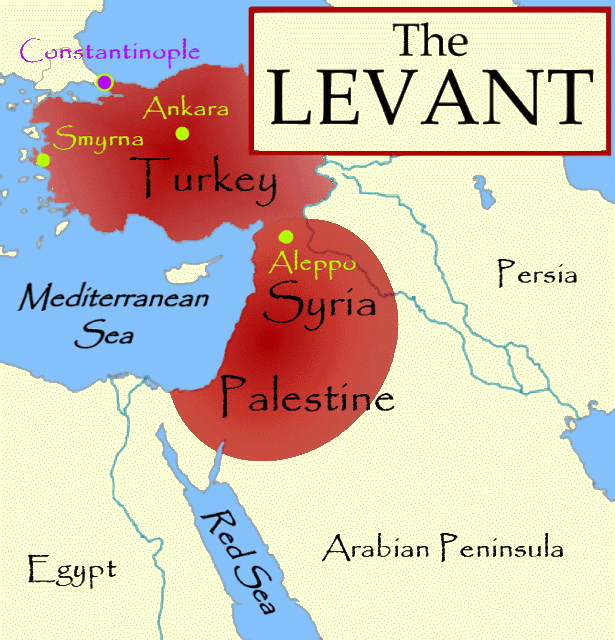GlobalView from Bishop Bill Atwood
By now, almost everyone has heard of the barbarism of the Islamic State. How it is discussed is pretty fascinating—although also odious, dangerous, and with far-reaching consequences.
For starters, there is the name itself. Why on earth is it that some people call this group “ISIS” and others call it “ISIL”? The answer is a poignant lightning rod for the “politically correct” culture and something that carries a boatload of additional meaning.
ISIS is an acronym for the Islamic State in Syria. ISIL stands for the Islamic State of Iraq and the Levant. Although it is true that the violent, fundamentalist Moslem group has spilled-out beyond Syria, that is not the main reason for wanting to use the term ISIL. The Levant is an area that looks like a blob across the Middle East.
Here it is on a map:
Those who use the term often do so for a reason that may not be readily apparent in the graphic above. They choose it because it ignores the presence of Israel. Ever since the “tensions” around the birth of Ishmael and Isaac (Gen 21), during which Hagar and Ishmael were sent away, there has been enmity between the two. The most stark component of this dissension is the denial by many Arabs (epitomized by ISIS and other places like Iran) of Israel’s right to exist as a state.
The use of the term ISIL to describe the militant, military, torture-mad fundamentalists carries with it a denunciation of Israel. The map above takes this even one step further by not even recognizing the presence of Israel, referring instead to the area as Palestine. While it is always dangerous to assign motives to people, it is troubling that the current President of the United States insists on referring to the terror group only as ISIL. This insistence, along with his lackluster support of Israel, may be more revealing than we want it to be.
The use of “politically correct” terminology has many motives, two of which seem to be exceptionally common when dealing with ISIS. The first is the mistaken idea that people are inherently good, so we have to give them the benefit of the doubt. Along with this misconception is a deep seated anti-semitism that seeks to dismiss Israel as being illegitimate.
Another reason that people often use “politically correct” language is that they want to stay “under the radar” and escape notice by the terrorists. It is beguiling to think. “If I speak well, or not at all about ISIS (and other terrorists), we may be able to avoid being noticed by them and thereby escape becoming a target.” It is a reasonable theory. Too bad it just doesn’t work.
In Arabic, there is another name for ISIS. Terrorists don’t like it. They prefer the name Islamic State because it seems to convey credibility (that is not deserved). That name in Arabic is Daesh (die-EESH), another acronym for Dawlat al-Islamiyah f’al-Iraq w Belaad al-Sham. (‘لدولة الإسلامية في العراق والشام’ )
The Islamic State (or Daesh) doesn’t like the term. There are a host of reasons why some say that the rogues don’t like it, but it basically comes down to two camps of objections. Some prefer the name with State in it because they think it makes them sound more legitimate. Others don’t like it because there are a variety of ways in which the acronym sounds like some demeaning words, implying bullying or crassness of one kind or another. The fact that ISIS doesn’t like the term Daesh, may be good enough reason to use it!
On the “What-the-heck-are-they-thinking” side of things in the swirling chaos surrounding ISIS (oops, I mean Daesh), there is news that the UK is allowing entry visas to people with links to all sorts of nefarious groups, but denying visas for Archbishops from areas of Iraq and Syria where Daesh has a foothold. Pakistani Imams who apply severe penalties for “Blasphemy” in places where it doesn’t make any sense can get visas to England. Why, oh why, would they deny Christian Archbishops entry? Some speculate that a low-level bureaucrat is denying the visas for people such as the Archbishop of Mosul, the Archbishop of Homs, and the Archbishop of St. Matthew’s Valley (Nineveh) because the UK government is concerned that they will overstay their visas and remain in Britain illegally. Egad! With their presence and pastoral responsibilities more pressing than ever, there is no way that they would abdicate. Now that Daesh is being pushed back, they are needed even more, and want to be back more than ever. The suggestion is ridiculous that there is too much risk to allow the Archbishops to visit England for the consecration of a new cathedral for the Syrian Orthodox Church in London.
Archbishop Athanasius Thoma Dawod of the Syriac Orthodox Christians in the UK said, “We cannot understand why Britain is treating Christians in this way.”
At the heart of the matter is what I wrote about last week. Power “elites” not only don’t listen to majority voices, they sometimes (!) act with utter stupidity, treating evil with overwhelming and incomprehensible naïvté, and treating good as though it is evil. Examples are legion. Look at government attacks on cup-cake bakers and photographers in the U.S. Look at the way Christian refugees are denied entry into the U.S. but un-vetted refugees from “another faith” are allowed to enter. Look at the way liberal Provinces vilify orthodoxy and recruit heretics.
Let’s assume that these stupid decisions are well intentioned. They are, nonetheless, paving stones on the road to hell.




